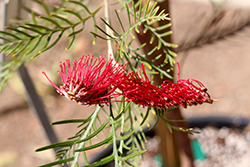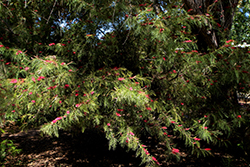It's all about ...
plants

Height: 12 feet
Spread: 12 feet
Sunlight:
![]()
![]()
Hardiness Zone: 9a
Description:
An adaptable species assuming a large, upright, airy form; grows well in most well drained soils; scarlet spidery flower clusters in winter and spring, then intermittently throughout the year; deeply dissected, ferny green foliage adds great texture
Ornamental Features
Red Hooks Grevillea features showy clusters of scarlet spider-like flowers at the ends of the branches from mid winter to late spring. The flowers are excellent for cutting. It has attractive green evergreen foliage which emerges chartreuse in spring. The deeply cut ferny leaves are highly ornamental and remain green throughout the winter.
Landscape Attributes
Red Hooks Grevillea is an open multi-stemmed evergreen shrub with an upright spreading habit of growth. It lends an extremely fine and delicate texture to the landscape composition which can make it a great accent feature on this basis alone.
This is a relatively low maintenance shrub, and should only be pruned after flowering to avoid removing any of the current season's flowers. It is a good choice for attracting bees, butterflies and hummingbirds to your yard, but is not particularly attractive to deer who tend to leave it alone in favor of tastier treats. It has no significant negative characteristics.
Red Hooks Grevillea is recommended for the following landscape applications;
- Mass Planting
- Hedges/Screening
- Rock/Alpine Gardens
- General Garden Use
Planting & Growing
Red Hooks Grevillea will grow to be about 12 feet tall at maturity, with a spread of 12 feet. It has a low canopy with a typical clearance of 1 foot from the ground, and is suitable for planting under power lines. It grows at a fast rate, and under ideal conditions can be expected to live for approximately 20 years.
This shrub does best in full sun to partial shade. It is very adaptable to both dry and moist growing conditions, but will not tolerate any standing water. It is considered to be drought-tolerant, and thus makes an ideal choice for xeriscaping or the moisture-conserving landscape. This plant will benefit from an application of bonemeal and/or mycorrhizal fertilizer at the time of planting. It is not particular as to soil type or pH. It is somewhat tolerant of urban pollution. Consider applying a thick mulch around the root zone in winter to protect it in exposed locations or colder microclimates. This particular variety is an interspecific hybrid.
This plant is not reliably hardy in our region, and certain restrictions may apply; contact the store for more information.

